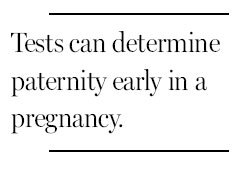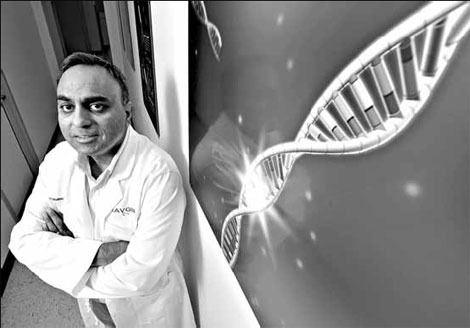Identifying dads without the risk
Updated: 2012-07-01 08:45
By Andrew Pollack(The New York Times)
|
|||||||
|
Ravgen charges $950 to $1,650 for its paternity test. Ravinder Dhallan, C.E.O. Steve Ruark for The New York Times |
Now blood tests can determine paternity as early as the eighth or ninth week of pregnancy, without an invasive procedure that could cause a miscarriage.
Besides relieving anxiety for women with multiple partners, the tests might allow women to terminate a pregnancy if the preferred man is not the father.
Men who know they are the father might be more willing to give financial and emotional support during the pregnancy, which some studies suggest might lead to healthier babies.
The testing requires a blood sample from at least one of the possible fathers.
Courtney Herndon, after breaking up with her boyfriend, had a brief relationship with a friend. She found herself pregnant at 19, without knowing which man was the father.
The friend agreed to testing. He turned out to be the father, and the two agreed on child support before the baby was born.
"I got the test done and was able to go on with my life," said Ms. Herndon, who lives in Fort Polk, Louisiana.
Estimates of the extent of paternal uncertainty vary. Studies have found a discrepancy rate - when the presumed father is not the biological father - of anywhere from 0.8 percent to 30 percent, with the median being 3.7 percent, one review found. Another found that about 9 percent of birth certificates in Florida, even excluding births to teenage mothers, did not list the full names of the father. Infant mortality was higher in those cases.
Amniocentesis and chorionic villus sampling, the procedures used to test a fetus for Down syndrome, can already determine paternity during pregnancy. But those procedures are invasive and carry a small risk of inducing a miscarriage.
The new tests require only blood samples from the pregnant woman and the potential father. And doctors generally do not have to be involved.
That could vastly expand testing, said Sara Katsanis of the Institute for Genome Sciences and Policy at Duke University in Durham, North Carolina.

Noninvasive paternity tests have been offered over the Internet for about a decade, and there have been complaints about inaccurate or fraudulent results.
But experts say such testing can now be done reliably. A paper describing one such test, developed by a company called Ravgen, was published recently in the prestigious New England Journal of Medicine.
The tests analyze fragments of DNA from the fetus that are present in the mother's blood. Researchers recently showed that they could determine a fetus's entire genome this way.
Ravgen, a small company in Columbia, Maryland, offers its test on a limited basis and charges $950 to $1,650, depending on the circumstances, said Dr. Ravinder Dhallan, the C.E.O.
Another test was developed by a Silicon Valley company called Natera, and is marketed by DNA Diagnostics Center, a leading provider of conventional paternity tests. Thousands of the prenatal tests have been ordered since going on sale last August, executives say. The price is $1,775, compared with around $500 for a conventional postbirth test.
Neither test has received a certification for accuracy that is required in child custody cases.
Some experts urge caution. The tests could be controversial if they lead to more abortions. But Dr. Dhallan said the test could persuade women who learned they were pregnant after a rape to keep the baby if they learned the rapist was not the father.
Ravgen's test was used in a murder case in Pennsylvania to establish paternity, although the evidence was not presented at trial.
Early testing could mean more paternal support. One Seattle-area woman said that when she was pregnant, with two possible fathers, "Neither one really wanted to be involved and then find out the baby wasn't theirs later."
When the prenatal test showed that the father was her former boyfriend, he attended the delivery and supported the child.
In Ms. Herndon's case, she and her exboyfriend eventually got back together and married, and he accepted the child.
The biological father sends gifts and pays child support.
The New York Times
(China Daily 07/01/2012 page21)
